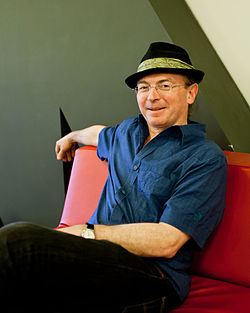Seth Lloyd
Seth Lloyd (born August 2, 1960 ) is an American computer scientist and physicist and professor in the Faculty of Mechanical Engineering at MIT in Cambridge (Massachusetts) . He mainly deals with the information-theoretical aspects of physics, quantum informatics and the physics of complex systems.
Lloyd studied at Harvard University (Bachelor's degree 1982) and the University of Cambridge (Master's degree in 1984). In 1988 he received his doctorate from Rockefeller University under Heinz Pagels ( Black Holes, Deamons and the Loss of Coherence: How complex systems get information, and what they do with it ). He then worked as a post-doc at Caltech and from 1991 to 1994 he was a post-doc at Los Alamos National Laboratory . From 1994 he was assistant professor, from 1998 associate professor and from 2002 professor at MIT. In between he was a scientist at SLAC in 1979 , at Brookhaven National Laboratory in 1980 , at Institut Laue-Langevin in Grenoble in 1981 and at CERN in 1982 . From 1987 he was also an Adjunct Assistant Professor at the Santa Fe Institute. He worked as a consultant for Hewlett-Packard and Microsoft (from 2000).
In 1981 he received the Sargent Prize at Harvard, in 1985 he received the Dirac Prize in Erice , the Edgerton Prize in 2001 and the International Quantum Communication Award in 2012 . In 2007 he became a Fellow of the American Physical Society .
His research area is the interaction of information with complex systems , especially quantum systems . He made significant contributions in the field of quantum computing , drafted the first feasible construction plan for a quantum computer , and proved some quantum mechanical analogues to Shannon-Hartley's law .
In his book Programming the Universe , Lloyd takes the view that the universe is a quantum computer that, in the course of its program, produces everything we see and ourselves. Once we fully understand the laws of physics, says Lloyd, with the help of quantum computers we will be able to fully understand the universe as well. Konrad Zuse and Stephen Wolfram made similar considerations .
In his essay The Computational Universe , Lloyd calculates the computing power and information content of the universe and comes up with a number of logical operations that could have been carried out since the beginning of the world, as well as bit information.
Publications
- Ultimate physical limits to computation In: Nature. 406, p. 1047, 1999 doi : 10.1038 / 35023282 . arxiv : quant-ph / 9908043v3 .
- The Computational Universe (2002)
- Programming the Universe: A Quantum Computer Scientist Takes On the Cosmos , Alfred A. Knopf, New York 2006, ISBN 1400040922
- About Seth Lloyd: Rüdiger Vaas : The Universe - the first quantum computer. In: Bild der Wissenschaft 8/2007.
- The universe as quantum computer . In: H. Zenil (Ed.): A Computable Universe: Understanding and exploring Nature as computation. World Scientific, 2013 arxiv : 1312.4455v1 [quant-ph] .
Web links
| personal data | |
|---|---|
| SURNAME | Lloyd, Seth |
| BRIEF DESCRIPTION | American quantum computer scientist |
| DATE OF BIRTH | 2nd August 1960 |


